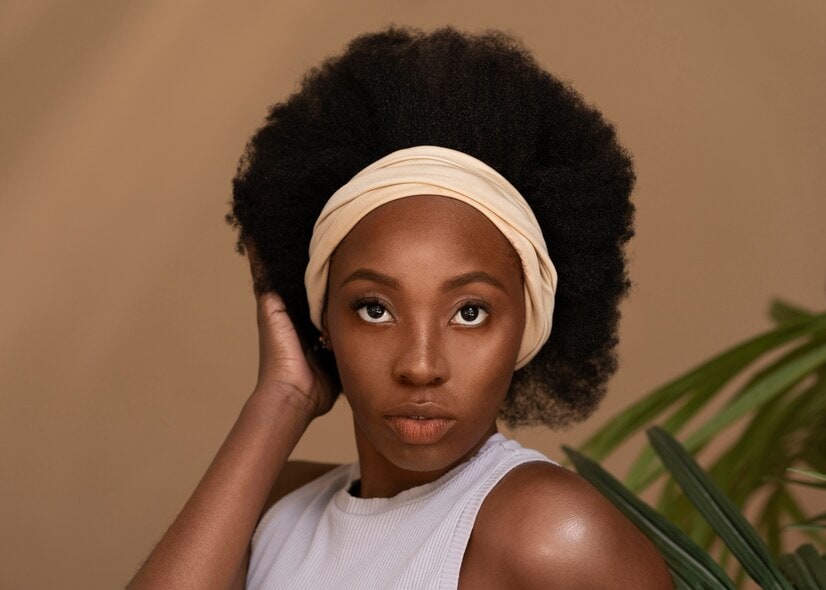
Essential Skin Care Tips for Black Skin
Did you know that black skin has unique characteristics that require specialized care?
Understanding the intricacies of black skin is crucial for developing an effective skincare routine.
Black skin contains high levels of melanin, a pigment responsible for the dark coloration.
Melanin acts as a natural sun filter, offering increased protection against UV rays compared to lighter skin tones.
However, the presence of melanin also makes black skin more prone to hyperpigmentation, which manifests as dark spots or patches on the skin.
Addressing hyperpigmentation and other skin concerns specific to black skin requires a tailored approach.
In this article, we will explore essential skin care tips and best practices for black skin.
From understanding melanin and its role in skin pigmentation to building a proper skincare routine, we will provide valuable insights to help you achieve a radiant and healthy complexion.
Key Takeaways:
- Black skin has unique characteristics due to its high melanin content.
- Melanin provides natural sun protection but also makes black skin more prone to hyperpigmentation.
- Understanding the role of melanin in skin pigmentation is crucial for effective skin care.
- A tailored skincare routine can help address hyperpigmentation and other common concerns in black skin.
- By following essential skin care tips for black skin, you can achieve a radiant and healthy complexion.
Protecting Your Black Skin: Sunscreen and Hyperpigmentation
When it comes to caring for black skin, protecting it from harmful UV rays and preventing hyperpigmentation are essential.
Black skin is naturally rich in melanin, a pigment that provides protection against the sun’s ultraviolet radiation.
However, this does not mean that black skin is invincible to the sun’s damaging effects.
It is crucial for individuals with black skin to use sunscreen regularly, as unprotected sun exposure can lead to hyperpigmentation and other skin concerns.
Sunscreen acts as a barrier between the skin and UV rays, reducing the risk of sunburn, premature aging, and skin cancer.
Understanding Melanin and Melanocytes
“Melanin is the pigment responsible for the color of our skin, hair, and eyes. It is produced by cells called melanocytes, which are found in the outer layer of the skin.”
Melanin helps protect the skin from the sun’s harmful effects by absorbing and dispersing UV radiation.
However, it does not provide complete protection, making sunscreen a crucial addition to a skincare routine.
Choosing the Best Sunscreen for Black Skin
When selecting a sunscreen for black skin, look for products that offer broad-spectrum protection against both UVA and UVB rays.
These rays can lead to sunburn, skin damage, and melanoma. Opt for sunscreens with an SPF of 30 or higher.
Additionally, consider using sunscreens that contain physical blockers like titanium dioxide or zinc oxide.
These ingredients sit on top of the skin and reflect UV rays, providing an extra layer of protection.
It’s also important to choose sunscreens that are formulated without harsh chemicals, fragrances, and additives that may irritate sensitive black skin.
Incorporating Sunscreen into Your Skincare Routine
To effectively protect your black skin from the sun, it’s crucial to incorporate sunscreen into your daily skincare routine.
Here are some tips:
- Cleanse your face with a gentle cleanser suitable for black skin.
- Apply a moisturizer that contains SPF.
- Wait for the moisturizer to fully absorb before applying sunscreen.
- Apply a generous amount of sunscreen to all exposed areas of your body, including your face, neck, ears, and hands.
- Reapply sunscreen every two hours or more frequently if sweating or swimming.
Remember, protecting your black skin from the sun is an everyday commitment.
By incorporating sunscreen into your skincare routine, you can safeguard your skin from harmful UV rays and reduce the risk of hyperpigmentation and other sun-related skin concerns.
Benefits of Protecting Your Black Skin with Sunscreen: |
Risks of Sun Damage without Sunscreen: |
|---|---|
| 1. Prevents hyperpigmentation | 1. Increased risk of sunburn |
| 2. Reduces the appearance of dark spots | 2. Accelerates skin aging |
| 3. Lowers the risk of skin cancer | 3. Potential skin damage |
Nourishing and Hydrating Black Skin: Skincare Products and Regimen
Proper skincare is essential for nourishing and hydrating black skin.
A well-rounded skincare routine can help maintain a healthy complexion, address specific concerns, and enhance the natural beauty of dark skin tones.
In this section, we will explore the key steps and recommended products for a comprehensive skincare regimen tailored to dark skin.
The Importance of Cleansing
A thorough cleansing routine is the foundation of any effective skincare regimen.
Cleansing not only helps remove dirt, oil, and impurities but also preps the skin for better absorption of subsequent skincare products.
Look for gentle cleansers that are specifically formulated for black skin, avoiding harsh ingredients that can strip the skin of its natural moisture.
To effectively cleanse black skin, follow these steps:
- Start by wetting your face with lukewarm water.
- Apply a small amount of cleanser to your fingertips and gently massage it onto your skin in circular motions.
- Rinse off the cleanser thoroughly with water, ensuring no residue is left behind.
Exfoliation for a Healthy Glow
Exfoliation is a crucial step in any skincare routine as it helps remove dead skin cells, promotes cell turnover, and reveals a brighter complexion.
Regular exfoliation can also help fade dark spots and even out skin tone.
When exfoliating black skin, it’s important to use products that are gentle and non-abrasive to avoid irritation and inflammation.
Look for chemical exfoliants that contain ingredients like alpha-hydroxy acids (AHAs) or beta-hydroxy acids (BHAs), as they can effectively slough off dead skin cells without causing excessive dryness.
Here’s how to incorporate exfoliation into your skincare routine:
- Choose an exfoliating product suitable for your skin type.
- Apply a small amount to your fingertips and gently massage it onto your skin, focusing on areas that tend to be more prone to hyperpigmentation.
- Rinse thoroughly with lukewarm water and pat dry with a clean towel.
Moisturization: Locking in Hydration
Moisturizing is a crucial step in any skincare routine, regardless of skin type.
For black skin, it’s important to choose moisturizers that provide intense hydration without leaving a greasy or heavy residue.
Look for moisturizers that contain ingredients like hyaluronic acid, shea butter, or ceramides, as they help replenish moisture, strengthen the skin barrier, and promote a healthy complexion.
To effectively moisturize black skin, follow these steps:
- After cleansing and exfoliating, apply a generous amount of moisturizer to your face and neck.
- Gently massage the moisturizer into your skin using upward circular motions until it is fully absorbed.
- Allow the moisturizer to penetrate the skin for a few minutes before proceeding to the next steps of your routine.
Addressing Dark Spots
Dark spots, also known as hyperpigmentation, are a common concern for individuals with black skin.
These areas of pigmentation can be caused by various factors, including sun exposure, acne, or hormonal changes.
To help fade and prevent dark spots, consider incorporating products that contain brightening ingredients, such as vitamin C or niacinamide, into your skincare routine.
These ingredients can help even out skin tone and reduce the appearance of hyperpigmentation.
Remember to always use sunscreen with a high SPF to protect your skin from further darkening caused by UV exposure.
Conclusion:
Essential Skin Care Tips for Black Skin
In conclusion, proper skincare for black skin is crucial in maintaining its health and radiance.
Understanding the unique characteristics of melanin, such as its role in skin pigmentation and protection against UV rays, is essential.
By addressing concerns like hyperpigmentation and incorporating a suitable skincare routine, you can enhance your natural beauty and achieve a glowing complexion.
One of the key steps in black skincare is the consistent use of sunscreen.
Sunscreen helps protect black skin from harmful UV rays that can lead to sunburn, skin damage, and hyperpigmentation.
Look for broad-spectrum sunscreens with an SPF of 30 or higher, specifically formulated for black skin.
Apply it generously, and remember to reapply every two hours, especially when spending time outdoors.
Taking care of black skin also involves nourishing and hydrating it through the use of appropriate skincare products.
Cleanse your skin with a gentle face wash, preferably one that does not strip away natural oils.
Moisturize daily to lock in moisture, prevent dryness, and maintain a healthy skin barrier.
Exfoliation can help remove dead skin cells, reduce clogged pores, and improve skin tone.
However, be cautious with exfoliation and opt for gentle products to avoid irritation.
Remember that every individual’s skin is unique, and what works for one person may not work for another.
It’s crucial to pay attention to your skin’s needs, adjust your skincare routine accordingly, and consult with a dermatologist if necessary.
With consistent care and thoughtful product choices, you can nourish and protect your black skin, promote an even skin tone, and achieve a vibrant, healthy complexion.
FAQ
What is melanin and how does it affect black skin?
Melanin is a pigment that gives color to our skin, hair, and eyes. It is responsible for the dark complexion of black skin. Melanin provides natural protection against harmful UV rays and helps reduce the risk of skin cancer. However, it can also lead to hyperpigmentation, which is an overproduction of melanin resulting in dark spots or patches on the skin.
Can black skin get sunburned?
While black skin has a higher natural SPF due to higher melanin levels, it’s still susceptible to sunburn and sun damage. It’s important to wear sunscreen with a broad-spectrum SPF of at least 30, regardless of skin tone, to protect against harmful UV rays.
What is the best skincare routine for dark skin?
A proper skincare routine for dark skin should include cleansing, moisturizing, and protecting from sun damage. Use a gentle cleanser twice a day, moisturize with products specifically formulated for dark skin, and apply sunscreen daily. Additionally, exfoliating once or twice a week can help remove dead skin cells and promote a healthy glow.
Can black skin be lightened?
Black skin is naturally beautiful and should be celebrated. It is not recommended to intentionally lighten black skin. Embrace your natural complexion and focus on maintaining its health and radiance.
What is the best sunscreen for black skin?
Look for sunscreen that is specifically formulated for black skin and offers broad-spectrum UVA/UVB protection. Choose products that are lightweight, non-greasy, and won’t leave a white cast on the skin. Physical sunscreens with zinc oxide or titanium dioxide can be a good option as they tend to blend better with dark skin tones.
Related read: Understanding White Skin Care & Complexion Tips







